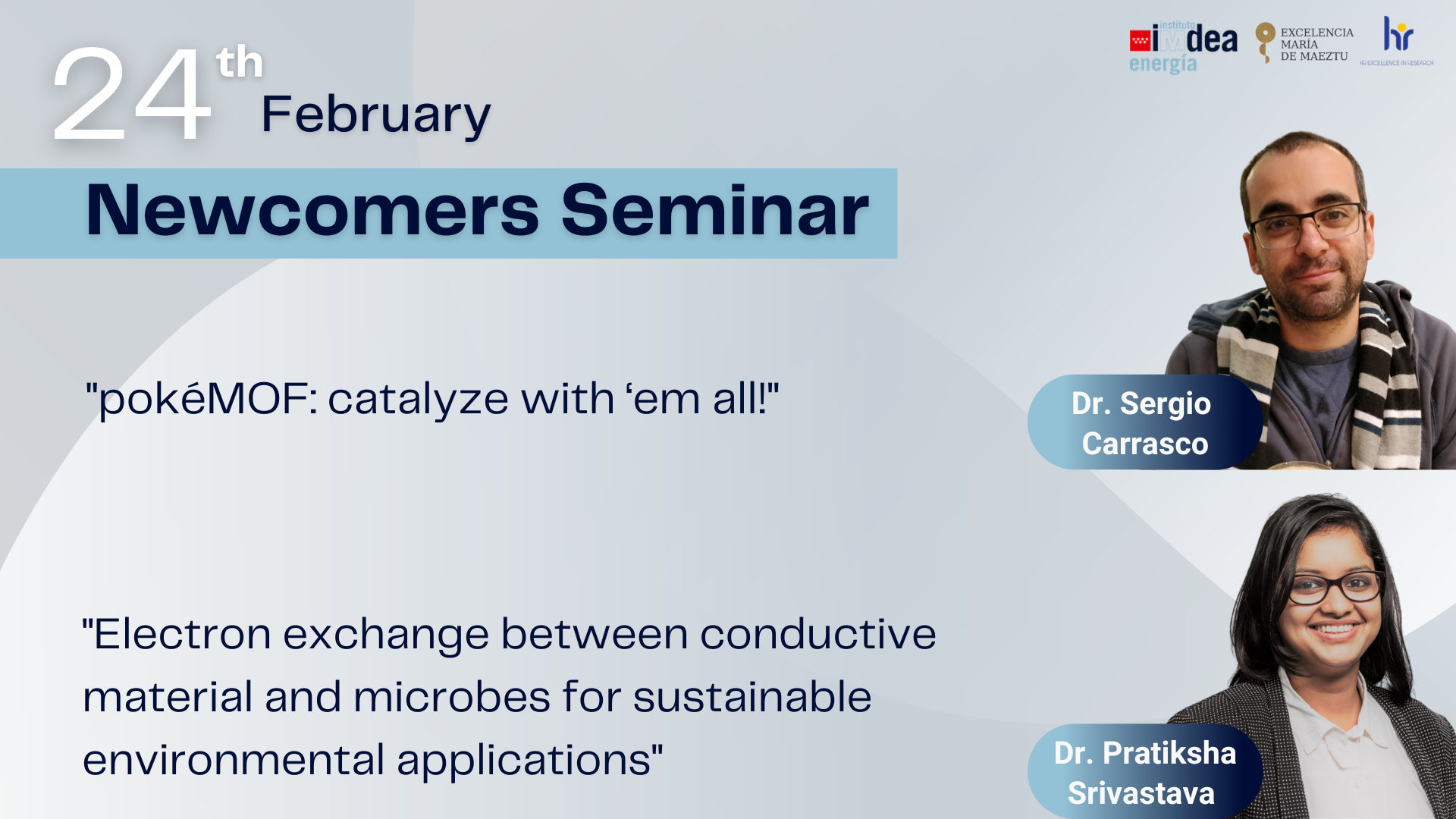Newcomers Seminar

Next February 24th at 12 noon we will hold a new session of the seminar for newcomers in the auditorium.
The first speaker will be Dr. Sergio Carrasco , from the Advanced Porous Materials Unit, with the talk entitle “pokéMOF: catalyze with ‘em all!”.
Short bio: Sergio Carrasco (BSc Chemistry and Materials Eng.) developed his PhD at Complutense University (Dpt. Analytical Chemistry) in molecularly imprinted polymers for the fabrication of optical sensors for the selective detection of antibiotics, for which he received the special doctorate award and the best thesis mention by RSEQ and SEA. He performed a 3-year postdoctoral stay at Stockholm University (Dpt. Organic Chemistry) where he specialized in the microwave-assisted synthesis and characterization of metal-organic frameworks (MOFs) for their application in catalysis: new C-C bond formation (Suzuki, Sonogashira) and CO2 valorization. In 2020 he returned to Spain with a MSCA-COFUND fellowship (Dpt. Chemical, Energy and Mechanical Technology, URJC) preparing MOFs for CO2 conversion into fuels and drug precursors. Since 2022, he is a postdoctoral researcher in the Unit of Advanced Porous Material at IMDEA-Energy focused on different catalytic processes to obtain green solar fuels: hydrogen through photocatalytic water splitting and alcohols and formic acid upon CO2 photo/electro-reduction, using novel MOFs and advanced MOF-based composites. He has participated in 1 regional, 3 national and 7 international projects, published 19 works, 4 book chapters and 1 patent, and contributed the state-of-the art with 6 new MOFs.
“pokéMOF: catalyze with ‘em all!”
Summary: Welcome to the world of pokéMOF. This world is plenty of polymers called pokéMOF. For some people, they are just new hybrid structures to collect. Others use them for sensing, storage or biomedicine. Myself…I study pokéMOF for catalysis as a profession. This presentation is an overview of the most relevant results and contributions of Dr. Carrasco to this world during his scientific adventure including: i) fast and efficient pokéMOF captures, using microwave instruments for optimizing new synthetic protocols; ii) recording and completing new entries in the pokéMOF database, after their general and advanced characterization; and iii) skills training, enhancing their activity as catalysts in C-C bond-forming and CO2 conversion reactions. The final catalytic performance is studied through different evolution strategies, known as pre- and post-synthetic modifications, e.g. ligand metalation, framework functionalization with polarizing groups and combination with metal nanoparticles, creating a novel pokéMOF generation based on powerful composites upon merging different types of materials.
The second one will be Dr. Pratiksha Srivastava, from the Biotechnological Processes Unit and Electrochemical Processes Unit, with the talk “Electron exchange between conductive material and microbes for sustainable environmental applications”.
Short Bio: Pratiksha Srivastava got her Ph.D. from University of Tasmania, Australia in the year 2021. Her Ph.D. was focussed on “Development of bio-electrochemical system based constructed wetland technology for efficient wastewater treatment and resource recovery”. She received Royal Society of Tasmania Doctoral award, Tasmania, Australia, for the best thesis in the Tasmania state. During her Ph.D. she had a research stay at Technical University of Braunsweig, Germany, funded by German Federal Ministry of research. Prior to joining IMDEA Energy she had a Postdoctoral position at Rey Juan Carlos University, Madrid, Spain. Based on her significant contribution to the sustainability research, she received the prestigious Green Talent award from the German Federal Ministry in the year 2017. She is also a recipient of the Nuffic fellowship, from the Netherlands, she also received an women scientist grant from department of Science & Technology (DST) India, and many other competitive grants at national and international levels. She has published more than 25 peer-reviewed articles including book chapters. She has more than 860 citations and 14 h-index based on google scholar. Currently her research focusses on the use of microbial electrolysis cell for green hydrogen production.
“Electron exchange between conductive material and microbes for sustainable environmental applications”
Summary: Bio-electrochemical systems (BES) is appeared as a potential sustainable technology for wastewatertreatment and complimentary electricity generation. BES consists of a set of technologies driven on microbes and conductive materials/electrodes interaction, that leads to a high catalytic rate at the microbe-electrode interface. The primary benefit of the favourable interaction between microbes and the conductive materials is that it can boost microbial metabolism in an electron acceptor deficient anaerobic environment. This pioneering technology has shown great potential for wastewater treatment with simultaneous electricity generation along with other environmental applications.
The event is finished.
Date
- Feb 24 2023
- Expired!
Time
- 12:00 - 13:00
Location
- Auditorio IMDEA Energía




Very interesting info!Perfect just what I was looking for!Raise blog range